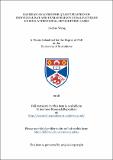Bayesian analysis for quantification of individual rat and human behavioural patterns during attentional set-shifting tasks
Abstract
Attentional set-shifting tasks, consisting of multiple stages of discrimination learning,
have been widely used in animals and humans to investigate behavioural flexibility.
However, there are several learning criteria (e.g., 6-correct-choice-in-a-row, or 10-out-
of-12-correct) by which a subject might be judged to have learned a discrimination.
Furthermore, the currently frequentist approach does not provide a detailed analysis of
individual performance. In this PhD study, a large set of archival data of rats
performing a 7-stage intra-dimensional/extra-dimensional (ID/ED) attentional set-
shifting task was analysed, using a novel Bayesian analytical approach, to estimate
each rat’s learning processes over its trials within the task. The analysis showed that
the Bayesian learning criterion may be an appropriate alternative to the frequentist n-
correct-in-a-row criterion for studying performance. The individual analysis of rats’
behaviour using the Bayesian model also suggested that the rats responded according
to a number of irrelevant spatial and perceptual information sources before the correct
stimulus-reward association was established. The efficacy of the Bayesian analysis of
individual subjects’ behaviour and the appropriateness of the Bayesian learning
criterion were also supported by the analysis of simulated data in which the
behavioural choices in the task were generated by known rules. Additionally, the
efficacy was also supported by analysis of human behaviour during an analogous
human 7-stage attentional set-shifting task, where participants’ detailed learning
processes were collected based on their trial-by-trial oral report. Further, an extended
Bayesian approach, which considers the effects of feedback (correct vs incorrect) after
each response in the task, can even help infer whether individual human participants
have formed an attentional set, which is crucial when applying the set-shifting task to
an evaluation of cognitive flexibility. Overall, this study demonstrates that the
Bayesian approach can yield additional information not available to the conventional
frequentist approach. Future work could include refining the rat Bayesian model and
the development of an adaptive trial design.
Type
Thesis, PhD Doctor of Philosophy
Collections
Description of related resources
Bayesian analysis for quantification of individual rat and human behavioural patterns during attentional set-shifting tasks (thesis data) Wang, J., University of St Andrews, 3 July 2018 DOI: https://doi.org/10.17630/38f4d940-d16d-4250-a845-c0f43d524a2fRelated resources
https://doi.org/10.17630/38f4d940-d16d-4250-a845-c0f43d524a2fItems in the St Andrews Research Repository are protected by copyright, with all rights reserved, unless otherwise indicated.

